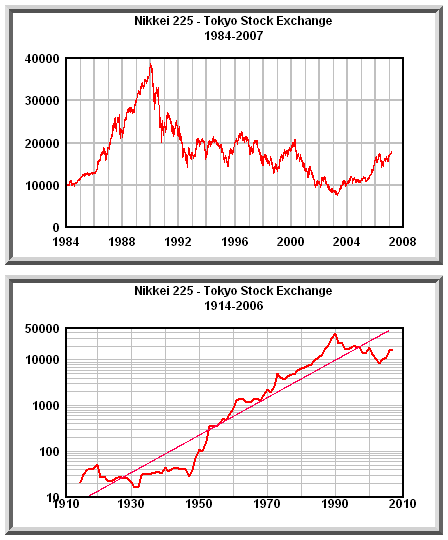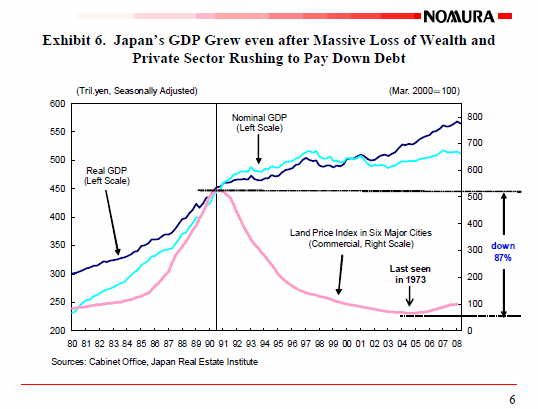
Dynamics

|
Generational Dynamics |
| Forecasting America's Destiny ... and the World's | |
| HOME WEB LOG COUNTRY WIKI COMMENT FORUM DOWNLOADS ABOUT | |
A study comparing Japan's deflationary spiral with ours shows the way.
 |
Japan seems to run 10-20 years ahead of the United States, at least in the area of stock market crashes.
Japan had a major stock market crash in 1919, leading to a new bubble 65 years later, beginning in 1984, and a new stock market crash in 1990.
The US had a major stock market crash in 1929, leading to a new bubble 66 years later, beginning in 1995, and a major financial crisis beginning in 2007, probably with a new stock market crash to come soon.
The current stock market bubble correlates with bailouts and stimulus:
This is another refutation of Richard Koo's stimulus theories....
(14-Oct-2009)
The effects of massive fiscal stimulus - Part II:
President-elect Barack Obama is turning apocalyptic in his speeches....
(12-Jan-2009)
The economic outlook for 2009 :
How we got to where we are today, who's to blame, and where we're going in 2009.
(5-Jan-2009)
The effects of massive fiscal stimulus.:
A study comparing Japan's deflationary spiral with ours shows the way....
(24-Dec-2008)
| ||
Thus, for people trying to understand what's coming, we have two big examples to look at: America in the 1930s, and Japan in the 1990s.
Now, an October presentation by Richard C. Koo, Chief Economist at Nomura Research Institute, compares Japan's 1990s deflationary spiral with America's in the 1930s and today. (The web site has links to the presentation slides (PDF) and to a video of the 1½ hour presentation.)
Koo says that what has happened in Japan -- a "balance sheet recession" -- is not in any economics textbook, and he now sees the same thing happening not only in the US, but in Europe, in Asia, and around the world.
I watched the entire 1½ hour presentation, and I was transfixed. This comparison of Japan with the US provides a great deal of insight into where the American and world economies are going.
A "balance sheet recession" occurs as follows (this is my way of formulating Koo's description):
Koo points out that this violates much of mainstream macroeconomic theory, which assumes that people and businesses will want to borrow money when interest rates are nearly zero. But monetary policy simply stops working.
Since monetary policy stops working, a government has to resort to fiscal policy -- a huge fiscal stimulus package. The purpose of this is to keep the GDP from falling. The government does the opposite of what the private sector is doing. The private sector is paying down debt, refusing to borrow and spend. The government borrows and spends huge amounts of money.
 |
Koo addressed several issues that arise:
The answer to this question is mind-blowing: There is no problem whatsoever, because the amount of fiscal stimulus is exactly equal to the national savings generated by everyone paying down debt. In other words, the savings of American people and businesses will pay for the borrowing.
It's worth noting that recent events seem to support Koo's claims. He gave this presentation in October. Since then, the yields on Treasury bills have crashed to zero, as investors compete to lend money to the government. So what he said would happen appears to be happening already.
Koo gave the following answer: The dollar would weaken, but since the same thing is happening to countries around the world, the dollar will remain at parity with other currencies. (This is not a fully satisfactory answer for me.)
Koo had previously said that tax cuts do not have the desired effect, since people will not spend the tax cuts, and will simply use the money to pay down debt. He didn't discuss social programs, but I would assume that the result is the same.
Koo said that there's no macroeconomic difference, but he added that the most effective spending program would be the military, since it creates jobs, but produces products that "are useless." Infrastructure projects, he said, aren't as effective because they produce useful products. He said that he hates this conclusion.
I would add the following, from the point of view of Generational Dynamics: One of the motivations for crisis wars is that when a man can't feed himself and his family, then he will blame his enemies, and he will have no objection to going to war. That's a microeconomic view of how a financial crisis leads to war. What Koo has done is clearly provide a macroeconomic view.
Koo notes that Europe needs to do a similar massive fiscal stimulus, but won't be able to because individual countries are prevented by the 1992 Maastricht treaty from spending more than 3% of GDP on fiscal stimulus.
As long-time readers of this web site know, I've been saying since 2002 that we're headed for a 1930s style Great Depression. I've read and commented on millions of words of stuff by people like Ben Bernanke, Paul Krugman, and other mainstream economists, and, as I've said many times, it's all crap. (In fact, during the course of his presentation, Koo also said that Bernanke, Krugman and mainstream macroeconomists were wrong.)
Koo's presentation is the first thing I've heard in years that's causing me to reassess some conclusions. I'm going to have to think about this for a few days or weeks, but these are my first thoughts:
I have a feeling that I'm going to be commenting on these concepts quite a bit in the next few weeks and months. For now, everyone who's into economics is urged to invest 1½ hours in watching the video of Koo's presentation.
(Comments: For reader comments, questions and discussion, as
well as more frequent updates on this subject, see the Financial Topics thread of the Generational Dynamics forum. Read
the entire thread for discussions on how to protect your money.)
(24-Dec-2008)
Permanent Link
Receive daily World View columns by e-mail
Donate to Generational Dynamics via PayPal
Web Log Summary - 2016
Web Log Summary - 2015
Web Log Summary - 2014
Web Log Summary - 2013
Web Log Summary - 2012
Web Log Summary - 2011
Web Log Summary - 2010
Web Log Summary - 2009
Web Log Summary - 2008
Web Log Summary - 2007
Web Log Summary - 2006
Web Log Summary - 2005
Web Log Summary - 2004
Web Log - December, 2016
Web Log - November, 2016
Web Log - October, 2016
Web Log - September, 2016
Web Log - August, 2016
Web Log - July, 2016
Web Log - June, 2016
Web Log - May, 2016
Web Log - April, 2016
Web Log - March, 2016
Web Log - February, 2016
Web Log - January, 2016
Web Log - December, 2015
Web Log - November, 2015
Web Log - October, 2015
Web Log - September, 2015
Web Log - August, 2015
Web Log - July, 2015
Web Log - June, 2015
Web Log - May, 2015
Web Log - April, 2015
Web Log - March, 2015
Web Log - February, 2015
Web Log - January, 2015
Web Log - December, 2014
Web Log - November, 2014
Web Log - October, 2014
Web Log - September, 2014
Web Log - August, 2014
Web Log - July, 2014
Web Log - June, 2014
Web Log - May, 2014
Web Log - April, 2014
Web Log - March, 2014
Web Log - February, 2014
Web Log - January, 2014
Web Log - December, 2013
Web Log - November, 2013
Web Log - October, 2013
Web Log - September, 2013
Web Log - August, 2013
Web Log - July, 2013
Web Log - June, 2013
Web Log - May, 2013
Web Log - April, 2013
Web Log - March, 2013
Web Log - February, 2013
Web Log - January, 2013
Web Log - December, 2012
Web Log - November, 2012
Web Log - October, 2012
Web Log - September, 2012
Web Log - August, 2012
Web Log - July, 2012
Web Log - June, 2012
Web Log - May, 2012
Web Log - April, 2012
Web Log - March, 2012
Web Log - February, 2012
Web Log - January, 2012
Web Log - December, 2011
Web Log - November, 2011
Web Log - October, 2011
Web Log - September, 2011
Web Log - August, 2011
Web Log - July, 2011
Web Log - June, 2011
Web Log - May, 2011
Web Log - April, 2011
Web Log - March, 2011
Web Log - February, 2011
Web Log - January, 2011
Web Log - December, 2010
Web Log - November, 2010
Web Log - October, 2010
Web Log - September, 2010
Web Log - August, 2010
Web Log - July, 2010
Web Log - June, 2010
Web Log - May, 2010
Web Log - April, 2010
Web Log - March, 2010
Web Log - February, 2010
Web Log - January, 2010
Web Log - December, 2009
Web Log - November, 2009
Web Log - October, 2009
Web Log - September, 2009
Web Log - August, 2009
Web Log - July, 2009
Web Log - June, 2009
Web Log - May, 2009
Web Log - April, 2009
Web Log - March, 2009
Web Log - February, 2009
Web Log - January, 2009
Web Log - December, 2008
Web Log - November, 2008
Web Log - October, 2008
Web Log - September, 2008
Web Log - August, 2008
Web Log - July, 2008
Web Log - June, 2008
Web Log - May, 2008
Web Log - April, 2008
Web Log - March, 2008
Web Log - February, 2008
Web Log - January, 2008
Web Log - December, 2007
Web Log - November, 2007
Web Log - October, 2007
Web Log - September, 2007
Web Log - August, 2007
Web Log - July, 2007
Web Log - June, 2007
Web Log - May, 2007
Web Log - April, 2007
Web Log - March, 2007
Web Log - February, 2007
Web Log - January, 2007
Web Log - December, 2006
Web Log - November, 2006
Web Log - October, 2006
Web Log - September, 2006
Web Log - August, 2006
Web Log - July, 2006
Web Log - June, 2006
Web Log - May, 2006
Web Log - April, 2006
Web Log - March, 2006
Web Log - February, 2006
Web Log - January, 2006
Web Log - December, 2005
Web Log - November, 2005
Web Log - October, 2005
Web Log - September, 2005
Web Log - August, 2005
Web Log - July, 2005
Web Log - June, 2005
Web Log - May, 2005
Web Log - April, 2005
Web Log - March, 2005
Web Log - February, 2005
Web Log - January, 2005
Web Log - December, 2004
Web Log - November, 2004
Web Log - October, 2004
Web Log - September, 2004
Web Log - August, 2004
Web Log - July, 2004
Web Log - June, 2004